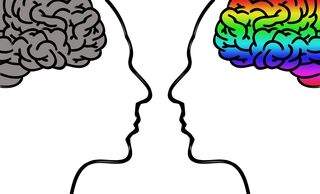Narcissism
Self-Love and Loathing in Borderline and Narcissistic PD
Different distortions in self-image.
Posted January 29, 2021 Reviewed by Ekua Hagan

While there is some similarity in borderline and narcissistic symptomology, there are some defining differences. One is their difference in self-image. The narcissistic personality is defined by self-love. It was named after the Greek God Narcissus, who was enthralled by the reflection of his own image. Individuals suffering from symptoms of borderline personality disorder experience self-loathing. This post will focus on how differences in self-perception can produce symptoms that appear similar but have different meanings and implications.
Self-Love
Most approaches to mental health agree that it is desirable to love oneself. The emphasis is to love yourself as you are. This is a critical aspect of mental wellness.
When self-love is based on a distorted image of the self, it can be associated with misdirected behaviors driven by these distortions. When these misdirected behaviors cause impairment in the ability to function in relationships then it becomes a personality disorder.
Narcissistic personality disorder is driven by distortions of grandeur. This includes the perception of the self as being better than others and hence entitled to special treatment. They are entitled to be served before others and they use special connections to get the best seats at events. The following conversation is an illustration of the narcissistic self-entitlement associated with Reed’s distorted perception of his superiority to others. He is speaking to his friend Barry.
Barry: I am frustrated waiting for my COVID shot. I will be one of the last people eligible.
Reed: Yeah, they are vaccinating the old folks first.
Barry: It seems like the right thing to do but I hate waiting.
Reed: There are ways around it.
Barry: What do you mean?
Reed: People like me don’t wait in line.
Barry: You already got your shot?
Reed: Of course.
Barry: But you are not eligible.
Reed: I am eligible when I say I am eligible.
Barry: How did you get it?
Reed: I know people who know people.
Reed believes that he is entitled to be vaccinated before others because “people like me don’t wait in line.” In other words, he feels that he is entitled to special treatment because he is special. In this situation, he apparently was able to convince someone in a position of power that he is special and got the vaccine. More often, they are not successful in convincing others of their self-distortion. When this happens conflicts can occur resulting in impairment in social functioning.
Self-Loathing
Self-loathing is rarely a sign of mental health. In individuals with symptoms of borderline personality disorder, the sense of self-loathing comes from fragmentation of the sense of self resulting in weak self-confidence and self-esteem. The unstable emotions and associated unstable relationships come from frequent and rapid changes in the way they see themselves. This makes it very difficult for them to trust themselves. Their impulsivity causes them to disappoint themselves by not living up to their own standards.
In close relationships, individuals with symptoms of BPD seek to have others disconfirm their self-loathing and fear that they are defective. Although they may appear to act entitled in their demanding behavior of others, they do not represent the entitlement as coming from their greatness; rather they represent it as coming from their brokenness. In the following dialogue, Freda is demanding that her father serve as her alarm clock and make sure that she gets up every morning in time for work.
Freda: Dad, I got a new job working for a veterinarian.
Dad: Congratulations! I am so proud of you.
Freda: Thanks, Dad. I have to be at work at 8 a.m. every morning.
Dad: That is a big responsibility but I am confident that you will be successful.
Freda: Can you call me every morning at 6:45 to make sure that I awake?
Dad: When?
Freda: Monday through Friday.
Dad: Why don’t you just set your alarm clock?
Freda: I might sleep through it.
Dad: Why don’t you set two alarms?
Freda: OK, I get it. You don’t want to help me. I will find someone else.
Dad: I don’t understand why you need this kind of help.
Freda: You don’t understand and you don’t care.
Dad approached Freda’s job with joy and confidence. She expresses a lack of confidence and made a codependent request of her father. She asked him to do something for her that she is capable of doing for herself. She demeans herself by insisting that she is not capable/competent, and in doing so increases her self-loathing. This drives her to be even needier of codependent service, either by her father or someone else, which causes her to feel more flawed and so it continues.
Borderline and narcissistic personality disorders share some characteristics which lead even some professionals to confuse the two. For example, individuals with either of these disorders tend to be demanding of others and act entitled. They both demand special treatment. But while this symptom may appear similar in both groups, it comes from different types of self-perception and serves different functions. Individuals with symptoms of narcissists experience self-love and demand special treatment because they believe themselves to be better than others. Individuals with BPD demand special treatment because they believe themselves to be defective. Both disorders benefit from the identification of patterns of distortion of self-perception and making corrections and accommodations.




